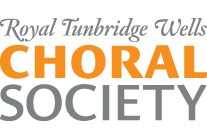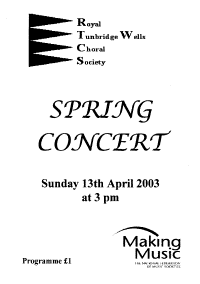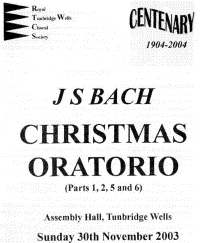Programmes and Reviews for 99th Season (2003-4)
Bach Christmas Oratorio
30th November 2003 in the Assembly Hall
In Memory of Mary Standen
This concert was directed by guest conductor Steven Devine. Derek Watmough will return in May to conduct his last concert before his retirement, after 30 years with the society.
This performance was especially notable because of the linking of a traditional British choral society with Finchcocks Baroque, an orchestra where period instruments were played in a truly authentic manner. Steven Devine chose lively tempi and this immediately captured the life and energy of Baroque music.
It was to the choir of about ninety’s credit that it caught the sense of vitality heralded by the orchestra. Considerable care was taken with phrasing and diction and a sense of line was always evident.
There was a true partnership between the excellent team of solo voices and the solo instruments, The urgent continuity between the items achieved by Steven Devine contributed greatly to the sense of drama and narrative. His timing was impeccable, exactly matching the mood changes, relaxing into contemplation when necessary. The choir responded with confidence and clearly regarded themselves as an equal partner with the orchestra rather than being accompanied by them.
The solo voices were Faye Newton (soprano), with her beautifully clear and pure vocal line, David Clegg (counter tenor) who is well known for his ability to portray characterisation and drama, Joseph Cornwell (tenor), whose narrative recitatives had great flexibility and control and Simon Grant (bass) who managed to convey religious detachment and strong presentation. These voices were of the highest calibre both in vocal quality and in musicianship. Their dignified and unobtrusive movements from stage left to centre to take part in the story added to the inherent drama of the music.
The soft tone of the instruments allowed a wonderful blend between the array of woodwind, including the oboe d’amore and original flauto traverso, and the gentle strings. The continuo was a fine balance between chamber organ and harpsichord placed on opposite sides of the orchestra. All the musicians played with a sense of articulation, so that a smaller dynamic range than we are used to was more than compensated for by the subtle shaping of musical lines. The clarity and energy of the orchestral sound encouraged the choir into an athleticism of which it can be proud. Steven Devine clearly saw them as equal partners and treated the amateur choir with the same unfussy trust and respect that he expected from the professional orchestra and they responded to his scholarly understanding of this splendid music.
The result was a performance which demonstrated a sense of artistic integrity beauty and excitement.
© Roger Evendon


